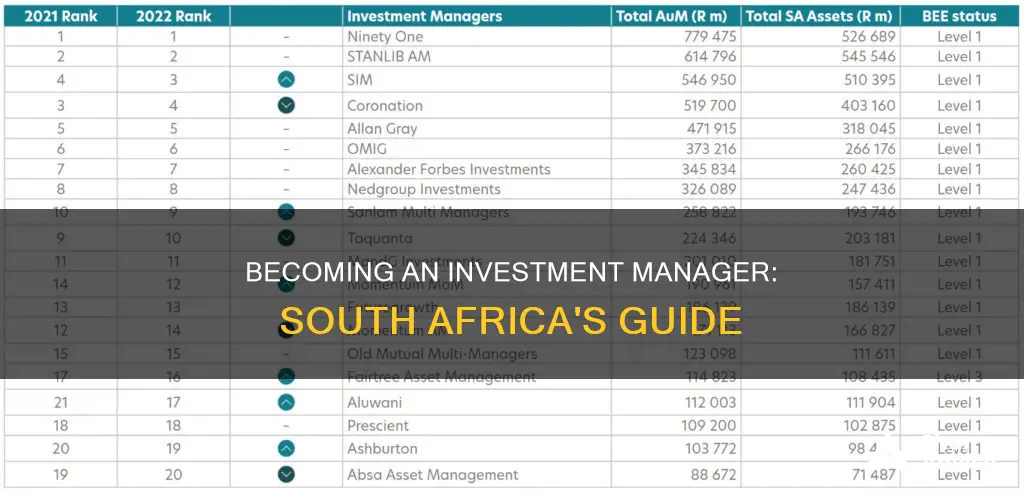
If you're interested in becoming an investment manager in South Africa, there are a few key steps you need to take. Firstly, you'll need to obtain a bachelor's degree in a relevant field such as business, economics, accounting, or finance. This typically takes three to four years and provides a solid foundation for your career. You might also consider pursuing a postgraduate degree, such as a Master of Business Administration (MBA) or a Master of Finance (MFin), which can give you specialised knowledge and a competitive edge in the job market. In addition, professional certifications like the Chartered Financial Analyst (CFA) designation can further enhance your qualifications. While education is important, don't underestimate the value of internships and networking opportunities to build your skills and connections in the industry. Once you've gained sufficient knowledge and experience, you'll need to register as a financial service provider (FSP) with the Financial Services Board (FSB) under the Financial Advisory and Intermediary Services Act (FAIS). This is a crucial step to ensure you can legally provide investment management services in South Africa. Keep in mind that the role of an investment manager comes with a lot of responsibility, as you'll be managing clients' investment portfolios and helping them maximise their financial returns. The average salary for an investment manager in South Africa is around R655,633 per year, but this can vary depending on factors such as experience and employer.
| Characteristics | Values |
|---|---|
| Average salary | R655,633 per year |
| Entry-level salary | R331,500 per year |
| Early career salary | R426,000 per year |
| Highest pay | ZAR 1m per year |
| Lowest pay | ZAR 151k per year |
| Minimum educational qualification | Bachelor's degree |
| Popular postgraduate degrees | Master of Business Administration (MBA), Master of Finance (MFin) |
| Popular professional certifications | Chartered Financial Analyst (CFA) |
| Minimum work experience | Four years |
| Average duration of study | Four to six years |
| Bachelor's degree duration | Three to four years |
| Postgraduate degree duration | One to two years |
What You'll Learn

Get a Bachelor's Degree in finance, economics, accounting, or a related field
A bachelor's degree is the minimum educational requirement to become an investment banker in South Africa. A bachelor's degree in finance, economics, accounting, or a related field is a common starting point and typically takes three to four years to complete. This educational path provides a solid foundation in financial concepts, accounting principles, and economic theories, which are crucial for a career in investment banking.
The bachelor's degree curriculum covers a range of subjects that are essential for a career in investment management. These include courses in financial management, financial analysis, investment theory, portfolio management, and economic policy, among others. This well-rounded education ensures that graduates have the necessary knowledge and skills to understand complex financial concepts and make informed decisions when managing investments.
During their studies, students can also expect to gain proficiency in using relevant software and tools for financial analysis and modelling, further enhancing their employability in the field. Additionally, this degree provides a strong foundation for further education and professional certifications, which are often sought by those aiming to advance their careers in investment banking.
It is worth noting that some investment banking firms may also offer internships or entry-level positions to students who are still pursuing their bachelor's degrees. This provides an excellent opportunity to gain practical experience and build a network in the industry, increasing the chances of securing a full-time position upon graduation.
Overall, obtaining a bachelor's degree in a relevant field is a crucial step towards becoming an investment manager in South Africa, providing the necessary knowledge, skills, and qualifications to embark on a successful career in investment banking.
Understanding Investment Portfolios: The Role of Equity
You may want to see also

Gain professional work experience
To become an investment manager in South Africa, you'll need to gain professional work experience. This typically involves working in the finance industry for four to six years, with some employers requiring at least five years of experience.
One way to kickstart your career in investment management is to pursue internships or graduate programmes within the finance industry. Many firms that offer internships also provide job opportunities after graduation. An internship will give you valuable hands-on experience and help you develop the technical skills needed for a career in investment management. These skills include extensive knowledge of mathematics, logical problem-solving abilities, reflective decision-making, excellent debating skills, and the ability to forecast projections.
During your professional work experience, you'll have the opportunity to apply the knowledge gained through your academic studies in a practical setting. You'll learn how to manage client investment portfolios, implement strategies to maximise financial returns, build investment portfolios tailored to clients' needs, and analyse investment strategies to evaluate their effectiveness.
It's important to note that the duration and specifics of your professional work experience may vary depending on the employer and their requirements. Some employers may offer rotational programmes or structured development paths to help you gain the necessary experience across different areas of investment management.
Understanding the Magic of Compounding in Your Investment Portfolio
You may want to see also

Pursue a Master's in Business Administration (MBA) or similar
A Master of Business Administration (MBA) is the most popular postgraduate degree among aspiring investment managers in South Africa. Obtaining an MBA can offer specialised knowledge in finance and provide a competitive edge in the job market. The duration of postgraduate programs typically ranges from one to two years.
Pursuing an MBA can be an excellent way to develop a strong foundation in financial concepts, accounting principles, and economic theories. The curriculum often covers a range of relevant topics, including financial analysis, investment strategies, portfolio management, and financial modelling. Additionally, an MBA program may offer opportunities to apply theoretical knowledge through case studies, group projects, and industry collaborations.
When choosing an MBA program, it is essential to consider the reputation and accreditation of the institution. Opting for a well-recognised university can enhance the value of your degree and open doors to a wider range of career opportunities. It is also beneficial to review the curriculum to ensure it aligns with your career goals and covers the specific areas of investment management you are interested in.
In addition to the academic benefits, MBA programs often provide excellent networking opportunities. They attract a diverse range of students and faculty members with various industry connections, which can be advantageous for building professional relationships and gaining industry insights. Many business schools also offer career services, including internship placements, mentorship programs, and alumni networks, which can further support your career development.
While an MBA is a common path towards becoming an investment manager, it is worth noting that there are other relevant postgraduate degrees, such as a Master of Finance (MFin), that can also provide a solid foundation for a career in investment management.
Consumption, Savings, and Investment: Understanding Aggregate Behavior
You may want to see also

Obtain professional certifications, such as the CFA
The CFA (Chartered Financial Analyst) qualification is highly regarded in the finance industry and is often seen as the "gold standard". It is a globally recognised qualification that links theory with real-world investment analysis and portfolio management skills. The CFA Program is administered by the CFA Institute, which sets the curriculum, administers the exam, and awards the charter. The program consists of three levels of examinations, with Level I offered four times per year and Levels II and III offered twice a year.
To qualify as a CFA charter holder, you must register and pass all three levels of examinations: CFA Level I, CFA Level II, and CFA Level III. The minimum duration to complete the program is three years, with each level taking one year. The entrance requirement for the CFA Program is a bachelor's degree or equivalent, or you can have less than two years remaining in your undergraduate studies, or you can have four years of professional work experience in any field.
The CFA Program covers a range of topics, including portfolio management, asset valuation, financial statement analysis, and corporate finance. It is designed for professionals and students seeking a career in wealth management, financial planning, and investment management. The program provides opportunities for charter holders to seek employment worldwide.
In South Africa, the CFA Certification is a popular finance certification for investment bankers. Obtaining this certification can enhance your credentials and open up global employment opportunities.
Understanding Your Financial Investment Portfolio Better
You may want to see also

Register as a financial service provider with the Financial Services Board
To become an investment manager in South Africa, you must register as a financial service provider with the Financial Services Board (FSB). This is a crucial step to ensure compliance with the relevant laws and regulations governing the industry. Here are the key details on registering as a financial service provider:
Understanding the FSB
The FSB was the South African government's financial regulatory agency responsible for the non-banking financial services industry, including investment managers. Its primary mandate was to supervise and regulate this industry, promoting a sound financial investment environment in the country. While the FSB was dissolved in 2018, its functions were transferred to two new agencies: the Financial Sector Conduct Authority (FSCA) and the Prudential Authority (PA). These agencies continue to oversee and regulate the financial services industry, including investment management.
Registration Requirements
To register as a financial service provider with the FSB (now the FSCA and PA), you must meet specific requirements. These requirements ensure that you, as an investment manager, adhere to industry standards and act in the best interests of your clients. The registration process typically involves demonstrating your qualifications, experience, and ability to provide financial services. This may include providing evidence of relevant degrees, certifications, and work experience in the field of investment management or financial services.
Compliance with FAIS
The Financial Advisory and Intermediary Services Act (FAIS) is a crucial piece of legislation that governs the conduct of financial service providers, including investment managers. As an investment manager, you must comply with FAIS, which sets out the standards for professional conduct, disclosure, and client protection. FAIS aims to protect consumers by ensuring that financial service providers offer suitable products, provide accurate advice, and disclose all relevant information.
Maintaining Capital Requirements
As an investment manager, you will be required to maintain specified minimum levels of capital. These capital requirements, known as "fit and proper" requirements, vary depending on the category of financial service provider you fall under. For example, non-discretionary FSPs must maintain liquid assets equal to or greater than a certain percentage of their annual expenditure. Adhering to these capital requirements ensures that you can meet your financial obligations and protect your clients' investments.
Regulatory Compliance
The FSB, and now the FSCA and PA, have strict regulatory frameworks that investment managers must comply with. These regulations cover various aspects of the industry, including marketing, disclosure, conflict of interest, and remuneration. As an investment manager, it is crucial to stay informed about the latest regulations and ensure that your practices align with these requirements. This demonstrates your commitment to ethical and transparent conduct in the financial services industry.
Customer Protection
A key focus of the FSB, and now the FSCA and PA, is protecting customers and ensuring they receive fair treatment. As an investment manager, you must adhere to customer protection regulations, which include providing clear and accurate information, handling complaints appropriately, and ensuring the safety and security of your clients' investments. By prioritizing customer protection, you can build trust and confidence in the financial services industry.
Savings-Investment Equilibrium: What's the Balancing Act?
You may want to see also







